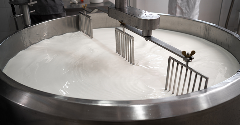News
Bidding War of “Origin” Yoghurts - Will it Still Sell and Where?
9 Nov 2015Lianne van den Bos, Senior Food Analyst at Euromonitor International, tries to make sense of how things will work out in the highly competitive yoghurt market.
Lianne van den Bos, Senior Food Analyst at Euromonitor International
@Lianne_vd_Bos https://twitter.com/Lianne_vd_Bos
See Lianne speak on Day 0 ‘Driving Dairy Innovation’ at Fi Europe - http://www.figlobal.com/fieurope/conference/day0
Greek style yoghurt has been one of the biggest success stories in dairy. Having initially caught on in the US, it soon spread to Europe, Latin America and now the Asian market. Chobani, one of the largest Greek style yoghurt brands, grew by US$1.8 billion in just seven years from the US market alone. For Chobani, 2011 was the turning point as the brand’s sales doubled over the previous year and hit the billion dollar mark.

Yet since the “big Greek” consumers have continued to be bombarded with new variants as brands try to piggyback on Greek yoghurt’s success. We’ve seen a plethora of new origin yoghurts claiming to be better than or different to Greek yoghurt, ranging from Australian creamier yoghurt in North America, to Icelandic yoghurt (Skyr) in Europe, to Bulgarian yoghurt in East Asia. The question remains whether consumers will be impressed with yet another origin yoghurt? Euromonitor assesses the potential of the latest launch of Bulgarian yoghurt in East Asia as well as where yoghurt should go next.
Bulgarian yoghurt success in Singapore and Thailand but is it enough?
Japanese dairy giant Meiji is attempting to differentiate itself in Asia by promoting its range of Bulgarianyoghurts. This has been supported by a US$3 million marketing campaign in Thailand, as well as strong media efforts in Singapore. As stated in the company’s future growth strategy, its aim is to “open the plain yoghurt market through unrelenting marketing efforts”, and it seems it has done so. However, is the return on investment enough to sustain growth?
Since its 2013 roll-out in Thailand, Meiji’s sales have increased by US$17 million up to 2015 (according to Euromonitor’s new provisional data) and it has overtaken leading player Dutch Mill Co Ltd in plain yoghurt as of 2014. While this may indeed have achieved Meiji’s objective of “open[ing] the plain yoghurt market”, it did so at considerable cost with its marketing efforts representing 20% of sales.
Drinking yoghurt preferred in East Asia
In most East Asian markets, drinking yoghurt is the preferred variant of yoghurt because of its lower unit price. As such higher-value origin-specific products such as Bulgarian yoghurt is not accessible to vast chunks of the population. While Meiji is banking on selling its range to the affluent middle classes in Southeast Asia, it is worth noting that this population in China, Singapore and Thailand represents under 25% of the total population.
Ratio of Drinking Yoghurt vs Spoonable Yoghurt Across Key Markets 2014

Developed markets should prove more attractive
The US, New Zealand and Australia should make far better target markets as consumers can afford premium products such as Bulgarian yoghurt and prefer spoonable yoghurt over drinking yoghurt. These markets are also more likely to favour products boasting health credentials such as the ones that come with Bulgarian yoghurt (which supposedly contains the best strain of LB81 bacteria which Meiji connects to helping people live longer). New Bulgarian yoghurt brand, Trimona, recently launched in the US, has been promoting the fact that its whey is not strained from the yoghurt (unlike Greek yoghurt) so itretains important minerals such as calcium, potassium and magnesium.
Australian-style yoghurt has been another trend in the US with WhiteWave Foods introducing Yulu yoghurt and Advent International acquiring a majority interest in Noosa Finest Yoghurt at the end of2014. With US per capita yoghurt consumption at 7kg, compared to Western Europe’s 12kg, the US market still has considerable growth potential and targeting millennials will be key to success.
The future of yoghurt across the globe
While there might be a plethora of origin yoghurts currently out there, it is something that will continue to sell in developed markets over the short to medium term as it offers excitement to the category and foodies will continue to be intrigued trying something new. Yet in emerging markets, affordability willweigh heavier as a key criterion and drinking yoghurt will continue to set the scene should prices of the likes of Greek and Bulgarian yoghurts remain that much higher.
In markets where yoghurt is already at its peak and widely features in consumers’ diets, origin-specific yoghurt might grow tired and convenience is likely to become a more critical success factor. The dairy industry here could take a lesson from Japan, which has seen a non-stick yoghurt lid, introduced by Meiji in partnership with Morinaga Group, enjoy commercial success. Instead of origin, the next big thing in Europe could instead be mess-free yoghurt.
Find out more:
http://blog.euromonitor.com/category/packaged-food
http://go.euromonitor.com/Passport-DemoRequest.html
Related news

Consumers dislike faba beans’ sensory profile
3 Jun 2024
Consumers display low acceptance of faba beans, with sensory properties such as bitterness a core concern, a study suggests. However, for product varieties such as cocoa-free chocolate, this attribute could prove to be a benefit.
Read more
Food scientists uncover new way to preserve nutrient and flavour quality
29 May 2024
Researchers have developed a method that guarantees food safety for low-moisture products, such as dried milk, while maximising quality by retaining vitamins, minerals, and flavours, they say.
Read more
FDA scrutinizes milk pasteurisation over HPAI risk
28 May 2024
The US Food and Drug Administration (FDA) is undertaking additional scientific research work to ensure that approved pasteurization processes are rigorous enough after retailer milk tests showed contamination from Highly Pathogenic Avian Influenza (HPA...
Read more
Magnum targets ice cream lovers’ moods with new flavours
2 May 2024
Unilever-owned Magnum has released a suite of “mood-inspired flavours” as the 2024 ice cream season kicks off. The offerings, marketed as the Magnum Pleasure Express, are Magnum's first foray into the “mood-food” category.
Read more
The eight global food trends shaping the future of dining
23 Apr 2024
Unilever’s Future Menu Trend 2024 report identifies the global food trends shaping the food service industry, providing insights into changing consumer preferences that could provide inspiration for packaged food and drink brands.
Read more
Report outlines how the US interfered with marketing restrictions on formula across the globe
18 Apr 2024
A recent investigative report by ProPublica unmasked the extensive interference by the US government in international regulations concerning the marketing of formula.
Read more
Ultra-processed food intake in South Africa at concerning levels, study suggests
19 Mar 2024
As South Africa considers introducing front-of-pack warning labels and strict marketing limits for unhealthy foods, research has found that low-income South Africans get around half of their calories from ultra-processed foods (UPFs) – “a cause for con...
Read more
India’s mithai market develops new ingredient and flavour profiles
18 Mar 2024
Mithai is a hugely popular dessert and sweet snack in India and manufacturers are experimenting with unique ingredients, new flavour combinations, and healthier versions to capture new audiences.
Read more
Unilever and Perfect Day’s animal-free dairy dessert: Is precision fermentation the future of dairy?
6 Mar 2024
Perfect Day, a precision fermentation dairy supplier, has partnered with Unilever's Breyers, a brand of ice cream and frozen dairy desserts, to launch Breyers lactose-free chocolate frozen dessert.
Read more
Macauba oil emerges as potential rainforest-friendly palm oil alternative
1 Mar 2024
Producers and researchers consider the rainforest-friendly credentials of Macauba palm oil and whether its sustainability credentials offer an opportunity to replace palm oil.
Read more